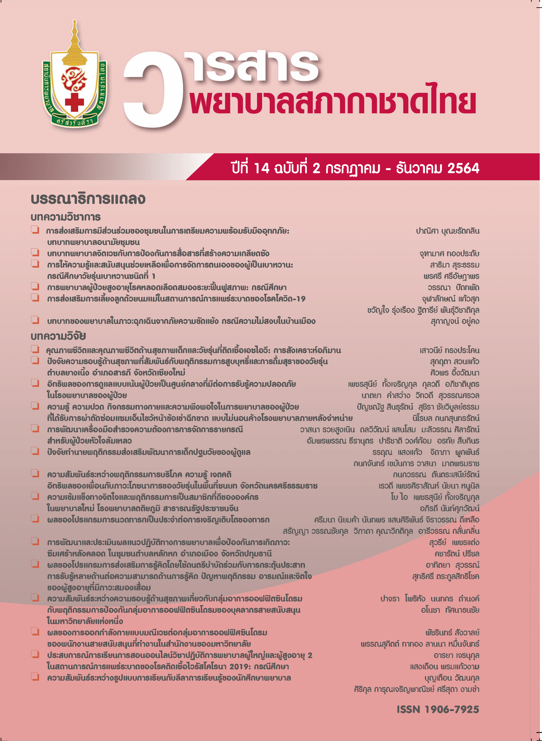Resilience and Organizational Citizenship Behaviors of New Nurses in Tertiary Hospitals, The People’s Republic of China
Keywords:
resilience, organizational citizenship behavior, new nurses, tertiary hospitalsAbstract
Strengthening resilience helps nurses to engage in positive organizational citizenship behavior. This descriptive correlational study aimed to explore levels of resilience and organizational citizenship behavior (OCB) among new nurses in the People’s Republic of China (PRC). The sample included 162 new nurses working in two tertiary hospitals in Xishuangbanna Dai Autonomous Prefecture, the PRC. The subjects were randomly selected by a stratified random sampling method. Research instruments consisted of the Chinese version of the Resilience scale (RS-CN) developed by Yang et al (2015), and the Taiwan Organizational Citizenship Behavior Scale (TOCB) developed by Farh et al (1997). The Cronbach’s alpha coefficient of RS-CN was .86, while that of TOCB was .88. Descriptive statistics and Spearman rank correlation coefficient were used in data analyses.
The results illustrate that the new nurses had a moderate level of resilience (M = 135.14, SD = 19.47) and a high level of OCB (M =6.33, SD = 0.46). Resilience was significantly correlated with OCB (rs = .521, p-value = .0001).
The results of this study highlight the importance of resilience on OCB and indicate a need for nursing administrators to find ways to increase resilience behavior of new nurses. Building resilience of new nurses by training, role models of resilience, and by providing support systems should be an important focus for nursing administrators.
References
Kovner CT, Brewer CS, Fatehi F, Jun J. What does nurse turnover rate mean and what is the rate ?. Policy Politics Nurs Pract 2014;15(3-4): 64-71.
Laschinger HK, Cummings G, Leiter M, Wong C, MacPhee M, Ritchie J, et al. Starting out: a time-lagged study of new graduate nurses’ transition to practice. Int J Nurs Stud 2016;57:82-95.
Phillips C, Kenny A, Esterman A, Smith C. A secondary data analysis examining the needs of graduate nurses in their transition to a new role. Nurse Educ Pract 2014;14(2):106-111.
Organ DW, Podsakoff PM, MacKenzie SB. Organizational citizenship behavior: its nature, antecedents, and consequences. Thousand Oaks: Sage Publications; 2006.
Farh J-L, Earley PC, Lin S-C. Impetus for action: a cultural analysis of justice and organisational citizenship behavior in Chinese society. Adm Sci Q 1997;42(3):421-44.
Paul H, Bamel UK, Garg P. Employee resilience and OCB: mediating effects of organizational commitment. Vikalpa 2016; 41(4): 308-24.
Yang Q. Leader-member exchange and organizational citizenship behavior among nurses in Tertiary Hospitals, Yunnan Province, The people’s republic of China [Master thesis of Nursing]. Chiang Mai: Chiang Mai University; 2012. (in Thai)
Chu L-C. Mediating toxic emotions in the workplace - the impact of abusive supervision. J Nurs Manag 2014;22(8):953-63.
Wagnild GM, Young HM. Development and psychometric evaluation of the resilience scale. J Nurs Meas 1993;1(2):165-78.
Yang F, Bao JM, Huang XH, Guo Q, Smith GD. Measurement of resilience in Chinese older people. Int Nurs Rev 2015;62(1):130-9.
Paul H, Garg P. Elevating organizational consequences through employee resilience [Internet]. 2012 [cited 2020 Nov 2]. Available from:
Hatmi K, Esmaeili R M, Sajadi HS. Predict organizational citizenship behavior of the staff based on the factors of the psychological capital and staff of Ministry of Sport and Youth. Turk J Sport Exe 2017;19(2):162-8.
Li Q, He LX, Peng H. Study on influence of “one-to-one” tutorial system on occupational self-efficacy of new nurses in intensive care unit and emergency department. Chin Nurs Res 2014;1:110-3.
Zhang YP, Huang X, Xu SV, Xu CJ, Feng XQ, Jin JF. Can a one-on-one mentorship program reduce the turnover rate of new graduate nurses in China? A longitudinal study. Nurse Educ Pract 2019;40:102616. doi: 10.1016/j.nepr.2019.08.010.
Guo YF, Cross W, Plummer V, Lam L, Luo YH, Zhang JP. Exploring resilience in Chinese nurses: a cross-sectional study. J Nurs Manag 2017;25(3):223-30.
Shi Y, Guo H, Zhang S, Xie F, Wang J, Sun Z, et al. Impact of workplace incivility against new nurses on job burn-out: a cross sectional study in China. BMJ Open 2018;8:e020461. doi:10.1136/ bmjopen-2017-020461.
Krejcie RV, Morgan DW. Determination sample size for research activities. Educ Psychol Meas 1970;30(3):607-10.
Wang L, Tao H, Bowers BJ, Brown R, Zhang Y. Influence of social support and self-efficacy on resilience of early career registered nurses. West J Nurs Res 2018;40(5):648-64.
Horner DK. Mentoring: positively influencing job satisfaction and retention of new hire nurse practitioners. Plast Surg Nurs 2017;37(1):7–22.
Eddins EE, Hu J, Liu H. Baccalaureate nursing education in China: issues and challenges. Nurs Educ Perspect 2011;32(1):30-3.
Downloads
Published
Issue
Section
License

This work is licensed under a Creative Commons Attribution-NonCommercial-NoDerivatives 4.0 International License.
เนื้อหาบทความหรือข้อคิดเห็นต่างๆ ในวารสารพยาบาลสภากาชาดไทยนี้ เป็นความคิดเห็นของผู้เขียนบทความ ไม่ใช่ความเห็นของกองบรรณาธิการ หรือสถาบันการพยาบาลศรีสวรินทิรา สภากาชาดไทย






